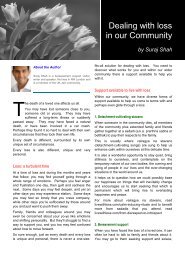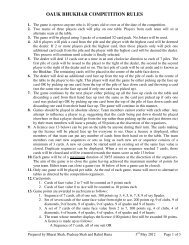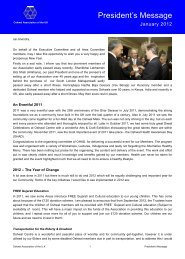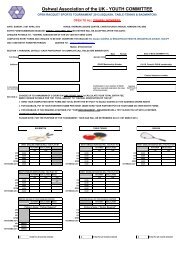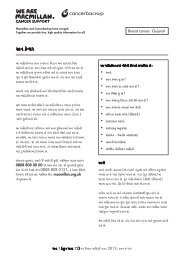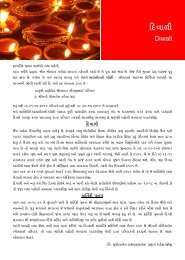Third Edition E-Magazine | April 2013 | www ... - Oshwal Centre
Third Edition E-Magazine | April 2013 | www ... - Oshwal Centre
Third Edition E-Magazine | April 2013 | www ... - Oshwal Centre
You also want an ePaper? Increase the reach of your titles
YUMPU automatically turns print PDFs into web optimized ePapers that Google loves.
~ Modern Food Ethics ~<br />
in bulk, stored for long time, and cooked in small<br />
quantities as and when required.<br />
Blood and bones in organic vegetables…<br />
Organic food is widely considered to be the cornerstone<br />
of the ethical food movement. In order to be certified<br />
organic, foods must be grown without artificial pesticides<br />
and fertilisers. In principle, this sounds completely<br />
consistent with the principle of Ahimsa and ideal for Jains<br />
in the West.<br />
In practice however, the ethics are less clear-cut. Instead<br />
of using petroleum-based fertilisers,<br />
organic farmers generally use<br />
crushed (animal) bones and blood<br />
instead. By purchasing organic<br />
fruits and vegetables, we actually<br />
provide a subsidy to the meat and<br />
slaughterhouse industries.<br />
In reality, it seems neither organic<br />
nor non-organic foods are ideal.<br />
TIP 12: Grow your own fruits and<br />
vegetables. In addition to being a<br />
healthy physical activity, growing<br />
your own foods is one of the only<br />
ways to ensure your foods are free<br />
of harmful pesticides and not fertilised with bones or<br />
blood.<br />
TIP 13: Support stock-free organic farms such as Tolhurst<br />
Organic Farm. These farms apply organic principles, but<br />
do not use animal products (blood, bones or manure) in<br />
farming. It is currently hard to get hold of their produce in<br />
London, but accessibility will improve with increased<br />
support.<br />
unpleasant or unenjoyable. Fortunately, Jainism teaches<br />
us why making changes to our diet may be in our own<br />
interests, and offers many tools to help us make changes<br />
in our life.<br />
Jainism teaches us how the pleasure we gain from<br />
luxurious foods is temporary, and how our attachments to<br />
food may actually be a source of suffering. The suffering<br />
is not just experienced by those who are adversely<br />
affected by dietary choices, but by ourselves too. We<br />
suffer when we are unable to obtain the foods we are<br />
attached to, and we may also bind karma when we<br />
consume them too.<br />
Jainism also provides many tools to<br />
help practice the art of detachment<br />
(vairagya). For example, fasting on a<br />
regular basis helps us detach<br />
ourselves from food and develop<br />
control over our senses and taste<br />
buds. If we are able to detach<br />
ourselves from the need to have<br />
luxurious and rich tasting food at<br />
every meal and recognise it is<br />
possible to nourish our bodies with<br />
relatively little – all meals can<br />
become fulfilling, even on a very<br />
simple, restricted, ethical diet.<br />
To conclude, the ethics of food in the Western world are<br />
complex, with many “ethical food” products actually<br />
involving far more violence than meets the eye.<br />
Following a diet truly consistent with Ahimsa is a big<br />
challenge. But by following some simple suggestions and<br />
using the tools offered by Jain teachings and traditions, it<br />
is very possible to gain greater control over our tastebuds<br />
and reduce the negative impact our dietary choices<br />
have on ourselves and the world around us.<br />
Ethical food is a challenge, but Jainism<br />
helps…<br />
Some people may read this article and feel that trying to<br />
adhere to a diet truly consistent with Jain principles in the<br />
Western world is a big challenge. I would agree.<br />
But accepting that it is a big challenge doesn’t mean that<br />
we should give up or not pay any attention to these<br />
issues at all. We all need to eat to live, and will inevitably<br />
end up eating a huge amount over the course of our lives.<br />
Over thirty years, even very small dietary changes can<br />
have a huge impact.<br />
Editor’s Note<br />
An earlier version of this article was published in the November<br />
2012 issue of the Young Jains <strong>Magazine</strong>. Thanks to Jyoti<br />
Mehta and the Jain Vegans team for helpful comments and<br />
suggestions.<br />
Some of the suggestions I have put forward (such as<br />
giving up cheese, fresh mango and papaya) may seem<br />
<strong>Oshwal</strong> News E-magazine of the O.A.U.K. 12 <strong>April</strong> <strong>2013</strong> <strong>Edition</strong>





